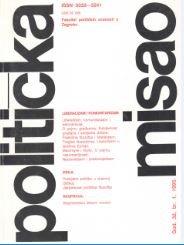Što danas znači biti građanin?
What Does it Mean to be a Citizen Today?
Author(s): Henning OttmannSubject(s): Political Theory, Government/Political systems
Published by: Fakultet političkih znanosti u Zagrebu
Keywords: citizen; citizenship; democracy; liberal democracy;
Summary/Abstract: The author’s definition of a citizen is based on B. Barber’s book Strong Democracy (1984). The ideal citizenship is closely linked to the concept of democracy. In liberal democracy (“thin democracy”) civic apathy and apolity prevails, so it is necessary to aim at “strong democracy”. Strong democracy is the one that has strong citizenry, i.e. self-governed citizens who actively participate in politics. This does not mean that representative democracy is to be relinquished; it is to be revived through the mutual cooperation of citizens. The civic virtue would be represented by “civility” marked by “empathy, respect and neighbourhood”. In the revival of bourgeois democracy, particular attention is being paid to the new means of communications. The weaknesses of Barber’s concept are, according to the author, equating citizens with neighbours, overemphasizing civic activity and putting too much confidence in latest technology (tele-voting). The concept of neighbourhood is civically too narrow, the activist mobilization may pose a danger while the political confidence in new technologies is dubious.
Journal: Politička Misao
- Issue Year: XXXII/1995
- Issue No: 01
- Page Range: 32-40
- Page Count: 9
- Language: Croatian

